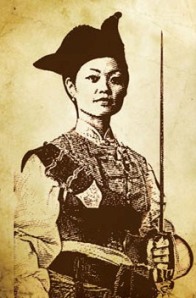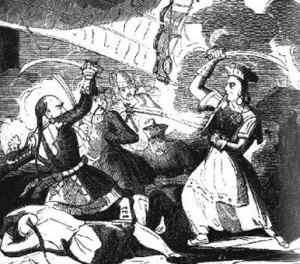The most successful pirate of all time controlled a fleet of more than 1,500 ships and upwards of 80,000 sailors — and she did it all without the help of facial hair.
To start with, Ching Shih (1775–1844) was only her stage name; it simply means “Widow of Zheng”. Her real name and her history prior to 1801 are completely unknown except for the fact that she was a prostitute in one of the famous floating brothels of Canton. She was captured in a raid by the powerful pirate Zheng Yi, commander of six pirate fleets, who appears to have known her professionally before the raid because his men were specifically instructed to bring the 26-year-old beauty to him. He had fallen deeply in love with her and proposed marriage, and she agreed on the condition that Zheng Yi grant her 50% of his profits and command of one of his fleets.
 Artist’s conception of Ching Shih (origin unknown)
Ching I Sao (“Wife of Zheng”), as she was then known, quickly won the respect of her men and her husband drew upon her shrewd advice to increase his power; his family had been noted pirates since at least the mid-17th century and the cunning former whore advised him to use that reputation in combination with intimidation to build an alliance of pirate fleets which until that time had engaged in self-defeating competition. By 1804 this alliance, known as the Red Flag Fleet, was the most powerful pirate force in China; it was comprised of over 1500 ships and ranged all the way from Korea to Malaysia. In 1807 Zheng Yi was killed in a typhoon, and his widow (now called Ching Shih) quickly made a pact with Chang Pao, the late commander’s chief lieutenant, which placed her in absolute command of the fleet with him as her executive officer. The deal appears to have been leveraged by her sex appeal, because they became lovers and later married (though sources vary as to whether this was before or after her retirement).
Ching Shih realized that in order to maintain control she had to establish strict discipline lest the men believe that a female commander could be defied with impunity. She therefore imposed a code of behavior far more severe than the pirate “articles” common in the Spanish Main: disobedience, theft, desertion, dereliction of duty, cowardice and rape of female prisoners were all punishable by beheading. Her power grew at a frightening pace, and within a year the Red Flag Fleet boasted two hundred oceangoing junks of twenty guns each, eight hundred small ships, dozens of riverboats and over 17,000 men; it was one of the largest navies in the world and nothing could stand against it. She extorted tribute from merchants all over the China Seas and from coastal towns from Macau to Canton, and became a de facto government in her own right; soon she began to impose taxes and levies and enforced her own laws.
Artist’s conception of Ching Shih (origin unknown)
Ching I Sao (“Wife of Zheng”), as she was then known, quickly won the respect of her men and her husband drew upon her shrewd advice to increase his power; his family had been noted pirates since at least the mid-17th century and the cunning former whore advised him to use that reputation in combination with intimidation to build an alliance of pirate fleets which until that time had engaged in self-defeating competition. By 1804 this alliance, known as the Red Flag Fleet, was the most powerful pirate force in China; it was comprised of over 1500 ships and ranged all the way from Korea to Malaysia. In 1807 Zheng Yi was killed in a typhoon, and his widow (now called Ching Shih) quickly made a pact with Chang Pao, the late commander’s chief lieutenant, which placed her in absolute command of the fleet with him as her executive officer. The deal appears to have been leveraged by her sex appeal, because they became lovers and later married (though sources vary as to whether this was before or after her retirement).
Ching Shih realized that in order to maintain control she had to establish strict discipline lest the men believe that a female commander could be defied with impunity. She therefore imposed a code of behavior far more severe than the pirate “articles” common in the Spanish Main: disobedience, theft, desertion, dereliction of duty, cowardice and rape of female prisoners were all punishable by beheading. Her power grew at a frightening pace, and within a year the Red Flag Fleet boasted two hundred oceangoing junks of twenty guns each, eight hundred small ships, dozens of riverboats and over 17,000 men; it was one of the largest navies in the world and nothing could stand against it. She extorted tribute from merchants all over the China Seas and from coastal towns from Macau to Canton, and became a de facto government in her own right; soon she began to impose taxes and levies and enforced her own laws.
 This sketch from 1836 imagines what Ching Shih might have looked like in battle.
Clearly, the Chinese government could not ignore this, so in 1808 it sent a fleet against Ching Shih; she easily defeated it, capturing 63 ships and impressing hundreds of sailors into her navy (those who remained loyal to the Emperor were beaten to death with clubs). Further attacks were equally unsuccessful, as were the attempts at rebellion by subject villages (which were burned to the ground and saw all their men slaughtered). In desperation, the Chinese government asked for help from the British and Portuguese; their forces, too, were defeated by the harlot admiral. By 1810 the government was forced to admit defeat and offered a general amnesty to all pirates who would give up their ships and arms. Ching Shih was no fool, and saw her opportunity to quit while she was ahead; accordingly, she appeared unannounced at the official home of the Governor-general of Canton and negotiated an incredible deal: she and all her men were given full amnesty and allowed to keep all of their loot, any of her men who wished to join the Imperial Navy would be allowed to do so, and Chang Pao received a lieutenant’s commission. Ching Shih thus retired from piracy at 35 and opened a combination casino and brothel which she operated until her death at the age of 69, survived by at least one son.
Ching Shih was quite probably the most successful pirate who ever lived; not only did she defeat all attempts to stop her and make staggering sums of money, but she also managed to keep all her profits and transition into a respectable business when she was still quite young. And considering that the half-share in the pirate fleet which set the stage for her eventual control of the whole was essentially a price for her favors, I think it’s fair to say she was among the most successful prostitutes of all time as well. She didn’t become an empress as Theodora did, but she essentially made herself a queen, foiled the efforts of the three greatest navies in the world and died a peaceful death as a wealthy, successful, respected businesswoman at a ripe old age.
This sketch from 1836 imagines what Ching Shih might have looked like in battle.
Clearly, the Chinese government could not ignore this, so in 1808 it sent a fleet against Ching Shih; she easily defeated it, capturing 63 ships and impressing hundreds of sailors into her navy (those who remained loyal to the Emperor were beaten to death with clubs). Further attacks were equally unsuccessful, as were the attempts at rebellion by subject villages (which were burned to the ground and saw all their men slaughtered). In desperation, the Chinese government asked for help from the British and Portuguese; their forces, too, were defeated by the harlot admiral. By 1810 the government was forced to admit defeat and offered a general amnesty to all pirates who would give up their ships and arms. Ching Shih was no fool, and saw her opportunity to quit while she was ahead; accordingly, she appeared unannounced at the official home of the Governor-general of Canton and negotiated an incredible deal: she and all her men were given full amnesty and allowed to keep all of their loot, any of her men who wished to join the Imperial Navy would be allowed to do so, and Chang Pao received a lieutenant’s commission. Ching Shih thus retired from piracy at 35 and opened a combination casino and brothel which she operated until her death at the age of 69, survived by at least one son.
Ching Shih was quite probably the most successful pirate who ever lived; not only did she defeat all attempts to stop her and make staggering sums of money, but she also managed to keep all her profits and transition into a respectable business when she was still quite young. And considering that the half-share in the pirate fleet which set the stage for her eventual control of the whole was essentially a price for her favors, I think it’s fair to say she was among the most successful prostitutes of all time as well. She didn’t become an empress as Theodora did, but she essentially made herself a queen, foiled the efforts of the three greatest navies in the world and died a peaceful death as a wealthy, successful, respected businesswoman at a ripe old age.

Artist’s conception of Ching Shih (origin unknown)

This sketch from 1836 imagines what Ching Shih might have looked like in battle.
No comments:
Post a Comment